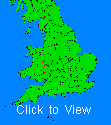Puttick Bloodline
Joseph Puttock married Ann
Batt on 4 May 1760 at St John The Baptist's Parish Church in Kirdford, Sussex.
I believe him to be my 5 x great-grandfather.
For all of his descendants (i.e. his children, his children's children, but not their spouses) down to the present day, I have mapped where they were born, married or died as far as is known to me.
I am only including those events dated to within one year (or better) and at a defined place in England or Wales (some of the Places are Registration Districts at which events were recorded rather than the actual Place of the event).
I have included people regardless of their surname.
Maps

|
This map shows the total count of Births, Marriage and Death events of those descendants by Ancient County, across all years from Joseph's marriage to the present day.
The top county by far is Sussex, but there are family centres in other counties where people moved.
|

|
This map shows the same events as above, but demonstrates that they were not evenly spread across the counties, but there were centres of activity.
As with many of my family lines, there was significant movement northwards into Greater London, but this is a relatively recent phenomenon.
|

|
This only includes Births (marriages and deaths now excluded), to help de-clutter the mapping.
Arbitrarily I have chosen the year 1900. It serves as a useful break-point for a change in the centuries-old ways of life and a transition to population mobility
and a move away from predominantly agricultural lifestyles.
Only selected locations (with larger numbers of births) are named on the map, although all are shown.
The London-wards migration had not really started by 1900, showing that their descendants remained very much rural Sussex based over generations - other than the
labourer who moved from Sussex to Eltham sometime 1841-49, and by having 8 children there founded a branch with many descendants.
|
No
Map
|
I have not plotted post 1900 births, as with the availability of railway travel, and a population migration to larger towns and cities, the many London-centric and South Coast
families would swamp any other groupings.
|

